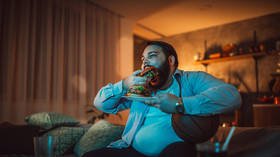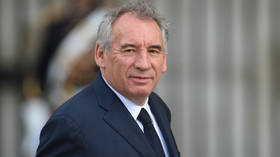After lockdown ends, will we be living in a brave new world or a FAT new world?

As we ease our stress through a diet of junk food, Netflix and physical inactivity, there is a real risk that our waistlines will grow whilst the economy shrinks.
As revolutionary and political theorist Vladimir Lenin once remarked there are decades where nothing happens; and there are weeks where decades happen. Few will dispute that we are living in interesting times.
Many people have seen their lives change in drastic and unexpected ways in the blink of an eye. Presently almost four billion people, roughly half the world’s population, are under some form of lockdown. As recently as a month ago few imagined that the UK, alongside most other nations, would soon impose hitherto unimagined restrictions.
The UK government introduced a lockdown on March 23 whereby citizens are only allowed to leave their house in specific circumstances, whilst ensuring they maintain a two meter distance from all others. Police have new powers to fine or arrest those not complying and Heath Secretary Matt Hancock has cautioned that restrictions could get tougher with outdoor exercise being banned altogether if a minority of people continue to flout the rules.
Also on rt.com Self-isolation may save lives, but exacerbates mental health issues & loneliness: I see consequences on a daily basis as a doctorThe lack of certain products in supermarkets and the queues outside have the flavour of those ‘dark days’ living behind the Iron Curtain about which some Western historians are so fond of speaking.
In just the last few weeks, a growing number of people in the UK and abroad have either lost their jobs or have been ‘furloughed (granted a leave of absence from work whilst continuing to be paid up to 80 percent of their wages). Others find themselves trying to balance working from home and childcare whilst schools remain closed; those of us still able to go to work appreciate this opportunity to interact with other people.
The sudden and unprecedented life changes brought about by Covid-19 will lead to a pandemic of stress. People cope differently under pressure and some will find it difficult to adjust to unemployment, confinement, having additional time on their hands, or being forced to isolate with an abusive partner or irritating family member. In addition to mental health problems that may be worsened by self-isolation, the public’s physical health could also suffer profound consequences.
A reduction in outdoor exercise together with an increase in ‘comfort-eating’ (also known as emotional eating) that occurs in response to prolonged periods of stress, during which greater amounts of the appetite stimulating hormone cortisol are released, will precipitate weight gain. Similarly, stress makes us crave foods that contain excessive amounts of sugar or fat – not the healthiest options. In times of stress women are more likely to partake in emotional eating whereas men tend to reach for a cigarette or the bottle. Excluding the fact that alcohol is filled with calories, being almost as calorie rich as fat gram for gram, the health effects of drinking excessively are well known.
Also on rt.com The Covid-19 lockdown is a death sentence for many women. Not from the virus, but from being stuck indoors with a violent partnerPrior to the Covid-19 pandemic, obesity was already acknowledged as a major public health issue together with its associated health consequences. The World Health Organisation reports that almost two billion adults, roughly 40 percent of the world’s adult population, are overweight with a third of these being obese. Obesity is a major risk factor for developing heart disease, stroke, diabetes and a range of other illnesses and occurs across the world, including in low and middle income countries.
So as people turn to junk food and entertainment to cope with life under lockdown, expect a lot of waistlines to grow even as the economy contracts. However, it doesn’t have to be this way! A growing number of gyms, fitness classes and meditation studios have begun live-streaming their classes meaning people can continue exercising whilst under lockdown. Perhaps some will even develop good habits and continue their exercise routines (outside confinement) once isolation ends.
One thing is clear, the world will change immensely on account of the pandemic and its aftermath. It is during times like these that Empires fall, alliances between nations are reformed, and other countries gain a greater share of influence on the global stage.
Like this story? Share it with a friend!
The statements, views and opinions expressed in this column are solely those of the author and do not necessarily represent those of RT.















